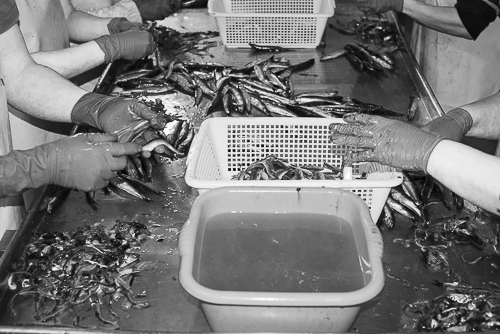On the way to Getaria, we drove along the coast where pilgrims were walking on the way to Santiago de Compostela. Getaria is a fishing town where fishing vessels are unloading their catch, which is brought to nearby fish processing plants. We went to the small, family-owned factory Salanort, which receive freshly fished anchovies from the Bay of Biscay and frozen octopus from Marocco.
Having found the correct place, we were met by Mr Koldo who willingly showed us around the factory. Since it was very small, our visit was rather short.
Salanort work mainly with anchovies, tuna and octopus, and they prepare the anchovies in two ways: salted fish, «en salazón», and cooked in vinegar, «boquerones». Upon arrival at Salanort, anchovies are put in brine for cleaning and killing harmful bacterica.
During our visit, some workers were preparing «Boquerón de anchoa del Cantábrico», in which they were cleaning and de-boning anchovies. After they have been cleaned three times in order to remove all residues of blood, they are put in a mixture of vinegar and salt for 24 hours, then they are cleaned again and put in trays, covering them either in vinegar, olive oil or a mix of both, next the trays are closed and labelled.
The octopuses are caught and frozen in the Mediterranean by Maroccan fishermen. At Salanort they are first thawed, sorted by size, next they are cleaned by a brush and put in brine for 24 hours in order to make the meat softer and more tasty. Afterwards, it’s cooked at 80°C before being transferred quickly to water at 4C in order to kill harmful bacteria. Lastly, they are cut up and pasteurised again. Finally, they are packaged and sold as «Pulpo cocido».

